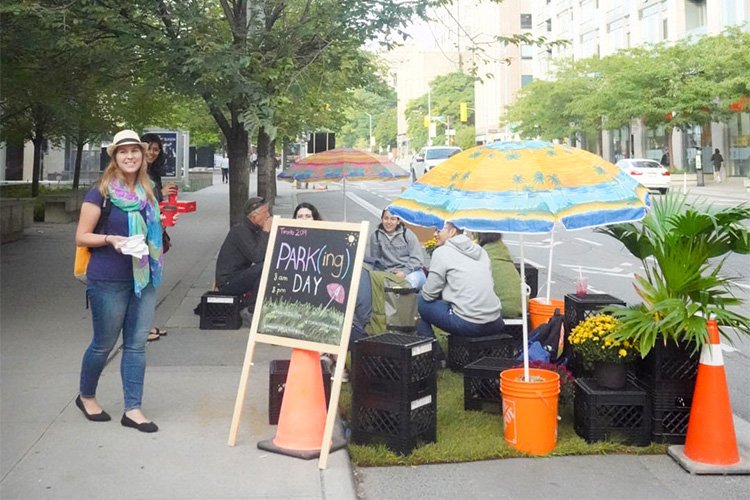Park(ing) Day began as a guerrilla art and design activism project launched by Rebar in a single parking spot in San Francisco in 2005. Since then, it has become an annual global annual event that boasts hundreds of installations in dozens of countries, with local urban activists temporarily re-purposing parking spaces and transforming them into tiny parkettes for art, design, play, and activism. Visit the My Parking Day website for the complete origin story.
In the beginning…
“The ethos of Park(ing) Day is to celebrate the use of urban public space for people and challenge the dominance of the automobile in cities. The event draws attention to the need for improving access and quantity of public open spaces in densely populated urban areas as well as the need for these spaces to provide social and environmental engagement.”
Park(ing) Day Toronto Edition
Past installations for Park(ing) Day in Toronto have included 2019 on Bloor Street spearheaded by a group of UofT Geography and Planning students, led by Kelly Gregg and Sneha Mandhan.
Dubbeldam Architecture + Design discovered Park(ing) Day in 2022 while researching alternatives to the City-owned asphalt boulevard parking spaces adjacent to their building. This led to a temporary transformation of the parking spaces into a people space during Doors Open Toronto in May. In June 2022, Dubbeldam launched the Toronto Edition of Park(ing) Day which hosted its first official Toronto Park(ing) Day in September complete with Yoga classes, BBQ, and kids sidewalk art!
FOOD FOR THOUGHT
Toronto has over 5,600 km of paved streets covering roughly one quarter of the area of the city. This area not only supports the movement of cars, a significant percentage is dedicated to parking. The Toronto Parking Authority (TPA) manages more than 20,000 metered on-street parking spaces, plus an estimated 40,000 spaces off-street parking spaces. This area dedicated to parking covers more than 400 acres of land for the TPA alone; this does not include private surface parking lots estimated to occupy more than 800 acres (shopping centres, stadium parking, etc.) or non-metered parking on residential streets.
COMPLETE STREETS
Adopted by Toronto City Council in 2014, the Complete Streets initiative strives to create a “better balance between motorized travel and other uses, including more space for trees and green spaces, which contributes to healthier air, lower summer air temperatures, more shade, and better stormwater management. This also makes our city more resilient to the effects of climate change.” Creating more inviting, green and diverse spaces for people to enjoy our urban environments has significant social, community, and economic benefits. More pedestrian-friendly and green streetscapes results in greater foot traffic for retail shops and restaurants and more vibrant urban areas. The places we love to spend time are not parking lots or busy streets but rather green spaces, parks and nature. It’s time to create more liveable cities that are not only more enjoyable but safer and healthier for the people that live there.
Over 700 other jurisdictions in North America have adopted Complete Streets guidelines including New York City and Chicago.





